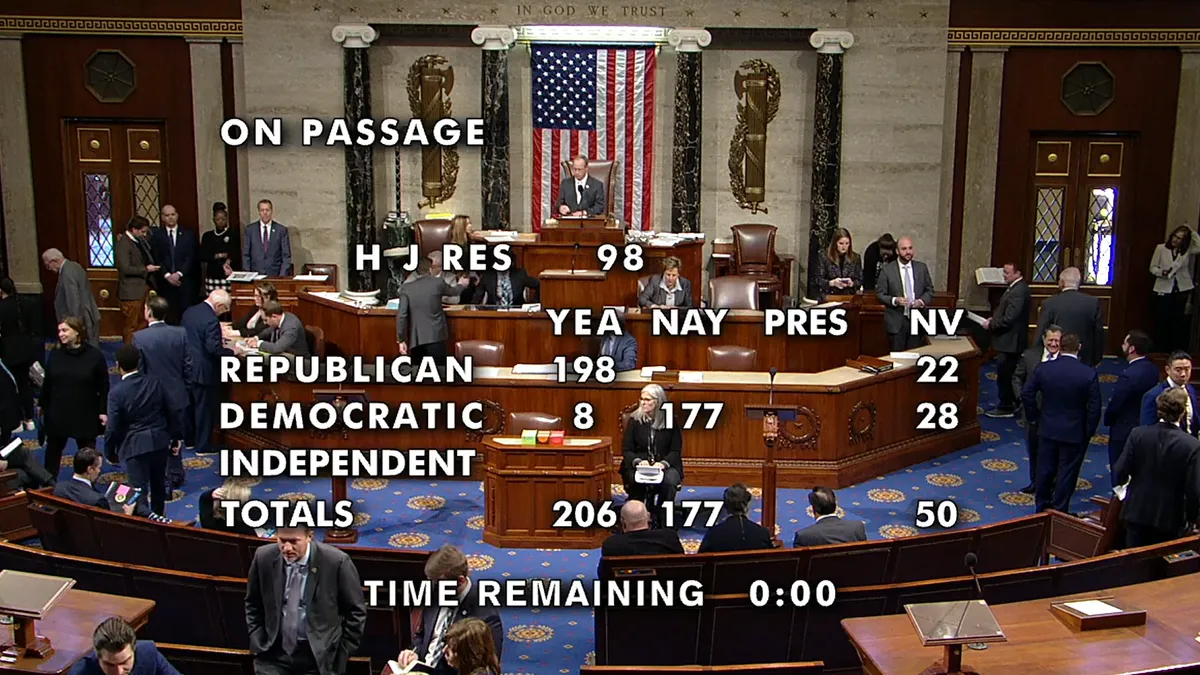UPDATE: Jan. 12, 2024: This article has been updated with comments from the National Restaurant Association.
Dive Brief:
- The House of Representatives voted 206 to 177 in favor of a Congressional Review Act disapproval resolution to overturn the National Labor Relations Board rule expanding the definition of joint employment.
- The vote is a significant victory for franchisors and their political allies as the CRA limits the amount of time Congress has to consider rejecting a rule.
- The CRA measure will now go to the Senate for consideration, debate and potential passage.
Dive Insight:
With Senator Joe Manchin (D-WV) on the record opposing joint employer, the NLRB rule will likely be defeated in any Senate vote, as CRA votes are simple majority votes. The rule’s fate, therefore, hangs on the ability of its supporters to prevent the rule from coming to a floor vote.
According to a Congressional Research Service fact sheet on the CRA, “when introduced, a CRA disapproval resolution is referred to committee like other legislation. A committee may choose to report a CRA disapproval resolution, but it may not amend it.”
The bill’s chances, should it come before the Senate’s Health, Education, Labor and Pensions Committee, are fairly slim. Senator Bernie Sanders (I-VT) is chair of the HELP committee. Given his track record of pro-union statements and legislation, including a hearing where the Senator grilled Starbucks’ ex-CEO Howard Schultz about alleged union busting, the CRA disapproval measure would be most vulnerable should it come before the HELP committee. Sanders and the majority of the committee could delay a vote until the expiration of the CRA’s review period, or kill the measure outright. After the expiration of the CRA review period, the measure would be vulnerable to a filibuster.
However, there is a rule that removes a bill from the consideration of a committee. If 30 senators sign a discharge petition, a bill may be removed from the consideration of the relevant committee. Discharge petitions are a rarely used legislative tool in the Senate, according to historian Robert Caro.
Neither Sanders’ office nor the Coalition to Save Local Businesses, an industry lobbying group fighting to overturn the joint employer rule, responded immediately to a request for comment on the potential Senate procedures.
The National Restaurant Association praised the passage of the measure in a statement emailed to Restaurant Dive.
“We appreciate the House taking the first step in this process and we hope that the Senate will follow,” Sean Kennedy, NRA’s EVP for public affairs, said in a statement.
Kennedy said the joint employer rule would hurt franchisors by holding them jointly liable for labor law violations committed by franchisees if the franchisor exercises indirect and reserved control over essential conditions of employment enumerated in the rule. A similar rule existed during the Obama administration, but with a more vague definition of essential conditions.
Kennedy accused the NLRB’s rule of “imposing onerous regulatory burdens and increased legal liabilities on restaurants.”












